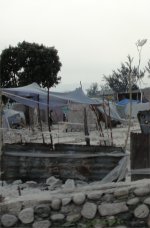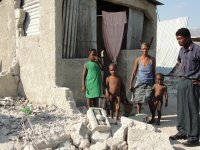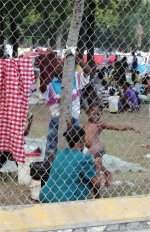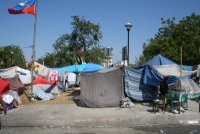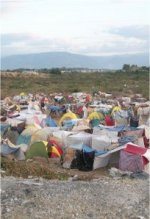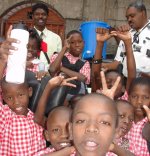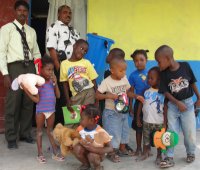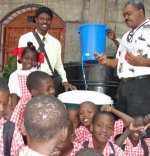| • Strengthening the future
of sustainable family farming in the Les Cayes area by bringing
together farmers, families and entrepreneur to encourage a
closer understanding of food production for the children in
our care.
• Provide funding to cover costs including food and
wages thought a ‘PowerPlay Poultry and Fish Project.
‘ |
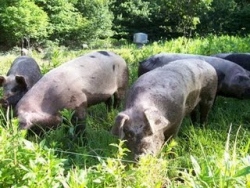
|
Introduction to the UCT PowerPlay
Child Care Center (PPCCC):
The objective of UCT is to establish PowerPlay Child
Care Centers (PPCCC) within the various areas in Haiti that we have
been working starting a pilot project in Les Cayes,
Aims and Objectives:
1. To meet Spiritual and physical needs of the orphaned
children in Haiti by providing basic housing within a loving family
environment.
2. To fight and eradicate poverty from the marginalized
and disadvantaged children through establishment of micro and macro
income generating activities especially agricultural enterprise,
each child care home will be on ½ acre of land enabling the
establishment of Kitchen Gardens and Animal Husbandry to encourage
self sufficiency.
3. To guard, protect and advocate for the fundamental
rights of children.
4. To train and equip personnel that will handle
children’s programmes across Haiti.
5. To coordinate children focused, character building,
activities within the Centers.
6. To strengthen and improve the quality of life,
of children and their families and attain economic self reliance
through sustainability initiatives and vocational training.
7. To act as a forum, drawing together and uniting
other children’s programmes in Haiti, so that they can adopt
common strategies and act collectively on matters of mutual concern
8. To liaise and dialogue with National and International
organizations in order to develop and improve on matters pertaining
community development, welfare of children and relief
Project Plan
•To purchasing lands in various areas in Haiti,
starting with a pilot project in Les Cayes. Over the years UCT has
been working in all these areas within Haiti and have identified
key persons that will be able to manage and run these PowerPlay
Child Care Centers. Personnel have already been trained in a variety
of children’s ministry programmes in preparation for this
project including Kids Evangelism Explosion and Kids In Ministry
International and other character building, life skills programmes.
•Constructing of 12 homes to house the house parents and a
minimum of 6 children maximum of 12 in each home. Eventually UCT
would like to include other facilities including schools if not
available, youth center and vocational training school within the
Child Care Center.
•Developing recreational play areas for children's education
and training, and for leisure activities including a football field
to encourage children's ministries such as KidsGames and educational
programs such as Kicking AIDS Out utilizing sports to teach the
children about HIV/AIDS.
•Developing enterprising projects such as farming and animal
husbandry to provide sustainability for the residents.
• Establish individual Kitchen gardens and
chicken farm on the land behind the child care homes as well as
a communal fish farm, Aquaponics and Agro Forestry.
•Establishment of two Bio Gas plant utilizing
chicken manure to create our own gas for communal cooking.
•Developing Permaculture Gardens designing
human settlements and agricultural systems that are modeled on the
relationships found in natural ecologies. These will be located
on the ½ acre plots of land that houses the child care homes.
•Producing income generating crops on the
agricultural land to enable the projects to administrative fees
and stipends to the house parents. Including animal fodder such
as Mulburry bushes.
•Providing training and employment opportunities
on site for older orphans in the form of vocational training
Cluster Development:
| 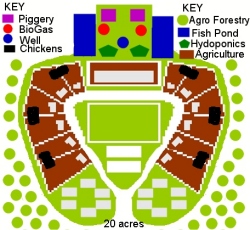
|
These 12 homes
will be positioned in a cluster development on a maximum of
10 acres of land. Cluster development is the grouping of the
residential structures on a portion of the available land,
reserving a significant amount of the site as protected open
space. The usable open space can meet a number of community
goals such as sports playing fields, agricultural projects
and animal husbandry to encourage sustainability. |
These basis 896 sq ft, four bedroom, two bathroom
property will be a earthquake and hurricane resistant home at affordable
prices resulting in a stronger, safer, more durable & energy
efficient home structure that is also environmentally friendly &
responsible in much less time than other construction systems. The
structural insulated panels have a polystyrene core and use the
stronger outer sheeting of cement sheet (like Hardibacker) not OSB
(oriented strand board). You do not need to fix sheet rock or waterproofing
to the panels as they arrive from the factory ready for painting
or tiling etc. saving you money and time.
Eco Friendly
The panels are made of renewable materials that are 100% recyclable.
The UN has approved this material for green building projects. The
added insulation of the polystyrene creates a far more efficient
home than conventional timber or concrete building methods. The
polystyrene insulation of the panels provide great sound proofing
& thermal resistance qualities.
Earthquake proof building materials
SIPs have been found to be the safest building system for earthquake
zones. Because a SIP house is glued and screwed, it will hold up
well against the strongest of earthquakes.
In 2004, the International Code Council’s
Evaluation Service (ICC-ES) approved the use of structural insulated
panels (SIPs) on the West Coast of the USA where high-risk seismic
zones exist (Seismic Categories D1, D2, and E.)
The product can also withstand 200 mile per hour
winds for hurricane prone areas.
Because this modern building product is fire resistant
is can be used to make a fire break between rooms. Your children
will be sleeping in the safest building system money can buy when
you build a SIP house.
SIP sizes & prices
Floor and roof panels are 6” thick. Wall panels
are 4" thick. All panels have both facings of 3/8 in. thick
hardboard fiber cement sheet panel. Panels come in lengths of 8'
or 10' or 12'.
SIPs are easy to cut with standard hand tools, which
eliminates complications on the job site, or the panels can be cut
for you at the factory.
The panels are prepared for easy assembly by placing
identifying marks before shipping them to you for assembly.
This is good news for all building professionals
and home buyers who want a stronger, safer home with the energy
savings and comfort that SIP built homes provide. The panel factory
makes each structural insulated panel as a sandwich. This simple
sandwich panel forms an amazingly strong insulated panel for building.
You can then use any kind of finishing, stucco, tile or rock.
HOUSEHOLD UTILITIES
Rainwater harvesting:
Rainwater harvesting is the accumulating and storing, of rainwater
for reuse. It has been used to provide water for livestock, water
for crop irrigation, as well as household usage eg bathing and flushing
toilets. Rainwater collected from the roofs of houses can make an
important contribution to the availability of drinking water, but
may require treatment or filtration before consumption. Rainwater
harvesting systems can be simple to construct from inexpensive local
materials, and are potentially successful in most habitable locations.
Each house within the PPCCC will be served with two large outdoor
water tanks and a solar pump to service an indoor tank for household
use and to be used in conjunction with the Sawyer PointOne Water
Filter.
Sawyer PointOne water filtration:
The Sawyer Point One Filter is the fastest, easiest and most cost
efficient way to get drinking water.
• Up to 500 gallons of potable water a day, cleaner than US
bottled water anywhere in the world!
• Millions of gallons for a onetime cost
• Simple gravity operated design
• Easy to maintain and use
• US $100 will provide a community filter including a 5 gallon
bucket and a 50 gallon tank with tap
UCT has distributed hundreds of these excellent filters in Haiti
following the earthquake and subsequent cholera outbreak earlier
this year.
http://www.unitedcaribbean.com/sawyerpointonefilter.html
Play Pumps www.waterforpeople.org
While children have fun spinning on the PlayPump merry-go-round
(1), clean water is pumped (2) from underground (3) into a 2,500-liter
tank (4), standing seven meters above the ground.
A simple tap (5) makes it easy for adults and children to draw water.
Excess water is diverted from the storage tank back down into the
borehole (6).
The water storage tank (7) provides a rare opportunity to advertise
in outlaying communities. All four sides of the tank are leased
as billboards, with two sides for consumer advertising and the other
two sides for health and educational messages. The revenue generated
by this unique model pays for pump maintenance.
The design of the PlayPump water system makes it highly effective,
easy to operate and very economical, keeping costs and maintenance
to an absolute minimum. A solar pump is supplied in case of insufficient
children ‘playing’ to pull up the water required for
a community. Capable of producing up to 1,400 liters of water per
hour at 16 rpm from a depth of 40 meters, it is effective up to
a depth of 100 meters. It is estimated that it will cost US $10,000
to dig the well and install the PlayPump.
Solar lighting
UCT will be researching the possibility of solar lighting for these
homes identifying companies that are already bringing relief to
Haiti such as Sol Inc.Sol believes ‘Energy is a Human Right’
and we assign a great priority to the importance of sustainable
energy.
Sol, Inc. was founded in 1990 and is the largest
and most established firm dedicated to the design and manufacturing
of commercial-grade solar lighting solutions. Based in Palm City
Florida, Sol has over 38,000 reliable solar lighting systems installed
worldwide. Sol’s solar lights systems provide trouble-free
lighting with unsurpassed levels of illumination and reliability
for numerous applications. We will be supplying each of our PowerPlay
Child Care Homes with a solar system because the electrical supply
in Haiti was difficult before the earthquake and has remained non-existent
in many regions since then.
Composting toilet
Pour-flush pit latrines overcome the problems of flies, mosquitoes
and odour by having a pan with a water seal (a U-shaped conduit
partly filled with water) in the defecation hole. Excreta deposited
in the latrine pan is flushed by pouring 1 litre of water into it.
Water remains in the U-shaped conduit blocking air flow and odour.
The mixture is directed into a pit and organic wastes are biodegraded.
Sludge has to be regularly emptied from the pit. The use of two
adjoining pits alternately enables the sludge in a full pit to undergo
further decomposition while the other pit is being used, and enables
manual sludge emptying after further sludge decomposition.
Bio Gas production plant
Domestic biogas plants convert livestock manure into biogas and
slurry or fermented manure. This technology is feasible for small
holders with livestock producing 50 kg manure per day, an equivalent
of about 6 pigs or 3 cows. This manure has to be collectable to
mix it with water and feed it into the plant. Pour-flush pit latrines
can be connected. Another precondition is the temperature that affects
the fermentation process. With an optimum at 36 C° which is
ideal for Africa. Depending on size and location, a typical brick
made fixed dome biogas plant can be installed at the yard of a rural
household with the investment of US $2,000.
A high quality biogas plant needs minimum maintenance costs and
can produce gas for at least 15–20 years without major problems
and re-investments. For the user, biogas provides clean cooking
energy, reduces air pollution from charcoal fires and reduces the
time needed to collect fire wood a job done especially by women
and children. The slurry is a clean organic fertilizer that potentially
increases agricultural productivity and will be used in the kitchen
gardens within each PowerPlay Child Care Home.
Income generating business opportunities:
Agriculture – The land in Haiti is over 10
acres in total we will only be using 6 acres for the PowerPlay Homes,
2 acres for the football and playing field, and 2 acres for the
animal husbandry. It is our plan to plant ground provisions and
vegetables which will generate an income to help cover the cost
of staff and administration. We want to encourage the families within
the program to grow more vegetables. Money is required for labour,
equipment, seeds, and natural fertilizers. These Kitchen Gardens
within the center will be an example to teach the children and the
community about improved food security and improved nutrition. Successful
farms have more than one enterprise. We will be encouraging a mixed
farming enterprise to improve cash flow and reduce financial and
business risk. The entire operation will be a model of ecologically
sustainable agriculture. Everything will be grown organically using
only natural fertilizer from the chicken and pig farm. Reclaimed
water is used whenever possible. We want our Kitchen Gardens to
be ecologically friendly and sustainable. The cost for a vegetable
garden setup is US $600 per family = US$ 7,200
Poultry farm: - Despite enormous potential, domestic
production still can not cover the needs of dairy products, eggs
and poultry and meat cuts in Haiti. 30 million eggs are consumed
in Haiti each year and out of that only 1 million are produced in
Haiti.
Total investment needed for 6 PowerPlay Poultry
Farms US $145,043.00
Fish farming - Fish provide valuable protein and
fish stocks commercial inland fish farming not only provides additional
fish but also much needed incomes.
The cost to build a 1 hectare fish farm pond is
US $6,915.14
The cost to build 6 Hydroponic greenhouses is US $60,000.00
Beekeeping - We want to set up
a beekeeping project within the Center. This project will provide
honey, and give a sustainable income.
The cost is US $600 per project X 12 = US $7,200
A keeper US$1000
Misc US $200
Purchase 1 box of bees is US $100
60 boxes = 5 boxes per child care home – US $6,000
First year Profits US $625 per family
US $52 per month per family
TOTAL US $435,414.60
SOWING SEEDS OF SUCCESS - MORINGA CURRICULUM
|

